Eurogamer staff
Curated From www.eurogamer.net Check Them Out For More Content.
You’ve probably already seen Eurogamer’s top 50 games of 2023, but we didn’t want to leave our end of year thoughts there. Big lists can sometimes feel impersonal, and as you know, tastes in games can be very personal. So we wanted to put together another kind of list, something that would show you – on a more personal level – the games that we, the people who write for Eurogamer, really enjoyed this year.
This brief series of articles will collect the top fives from a handful of different Eurogamer contributors, and we’ll publish a handful of them each day for four days. We’re not ordering the top fives because it’s not really about that this time – ordering things. It’s more important for us, here, to give you a sense of why.
Oh and please feel free – in fact, feel encouraged – to share your top fives below.
Lottie
Birth
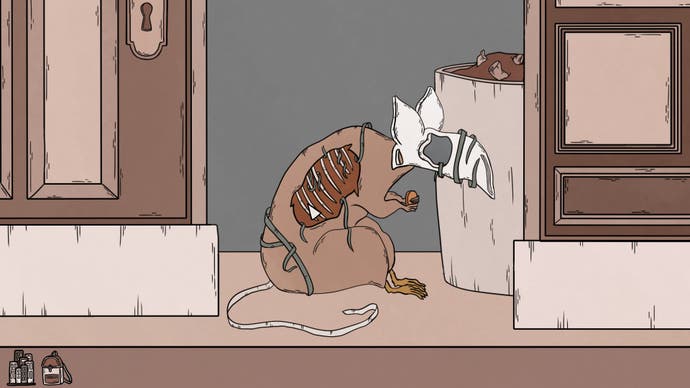
There’s a subtle horror to the world of Birth, with its eyeball-arranging puzzles and skeletal inhabitants, that I find tantalising. Weaving my way through the city – be it in the cafe or a stranger’s apartment I just let myself into – I couldn’t help but wonder if this was the true nature of Birth’s reality or a surreal creation born from loneliness. It’s a question Birth does answer in a way, if you know where to look, but that’s the hidden poison of deep loneliness isn’t it? How it can twist your world into something so misshapen that finding the effort to rebuild it can feel impossible.
Yet, at the same time, I found Birth to be a beautifully comforting game as it’s about escaping the lonely chasm. Many of the puzzles you solve involve wordlessly assisting one of the city’s citizens; transforming the bone or organ you receive into a present rather than an object you take. So, though I was collecting these body parts to build a friend, I was also slowly creating connections through the simple act of being kind. For Birth is about seeking out companionship even when you feel ever so alone and, like the partner you aim to build, has a ‘wet warm heart’.
A Space for the Unbound
Set in Indonesia, A Space for The Unbound wants you to believe it’s a science-fiction coming of age story about Atma and Raya, teenagers who develop supernatural powers. In truth, it’s a tale about the human heart and what happens when someone is pushed to the edge of despair. Enchanted by the characters, I found myself swept along by the game’s story and unable to do anything else until I reached its ending. A Space for The Unbound explores depression and anxiety in such a heartfelt and sympathetic manner, without ever feeling condescending, to a degree I’ve never experienced in a video game before. At every moment I could feel the care and understanding the developers had used to craft the game, especially with how it marries mourning the past and hoping for the future in its conclusion.
Little Goody Two Shoes
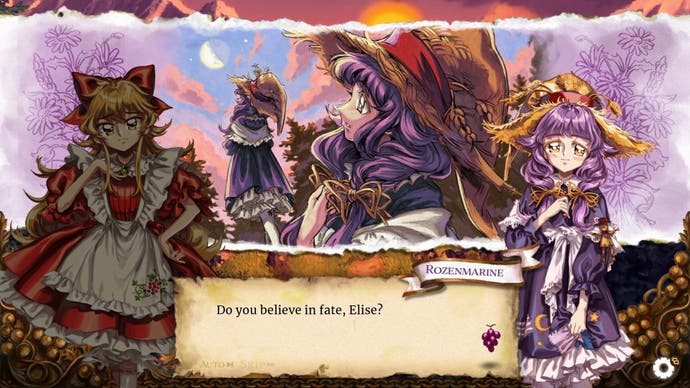
Little Goody Two Shoes is a dark fairytale about how far someone might go to get what they want, portrayed through a blend of gorgeous pixel graphics and 90s-esque anime art style. All might feel peaceful during the day, as Elise, our heroine, goes about earning money and attempts to win a lady’s heart, but when night falls, she must journey into the woods if she wants to fulfil her desires. Here the art style departs from its traditional fairytale aesthetic to embrace the horror and the surreal, with hands bursting from the ground and moths whose wings are decorated with eyes.
Not all monsters come out at night though, and while Elise’s personality may feel frustrating at first, she’s easy to sympathise with. Especially since the game isn’t afraid to make fun of her boastful nature – a personal highlight is a short musical sequence which leads to a great joke when you realise exactly what Elise has just been doing. Despite being brought up in the village community, Elise is still an outsider and, the further I ventured into the game, the clearer it became that it wouldn’t take much for the villagers to consider the strange orphan girl a witch.
While I was first attracted to Little Goody Two Shoes by it telling a lesbian horror story, I quickly came to enjoy the delicate balance of the survival and time management mechanics. You must keep Elise well fed for her to survive, but each day is split into six time periods, and progressing to the next costs food – and food costs money. This leaves you to decide whether you’ll spend a morning earning money for bread, or seeing the woman who’s caught your eye. Sure, you can take another job in the afternoon, but will you earn the same amount of coin? Skip on the date, however, and your relationship might not be developed enough for events later on. It’s a collection of mechanics which invite careful thinking and can make the dark nights feel even deadlier.
Coffee Talk 2
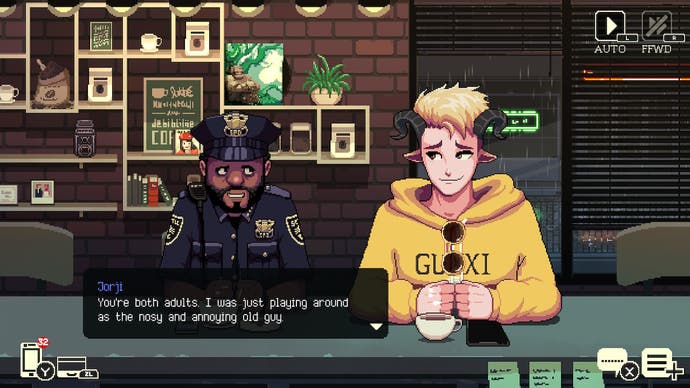
Coffee Talk 2 returned me to a world I fell in love with three years ago. Seeing the characters from the original game again felt like catching up with old friends and I enjoyed learning how their lives had developed. Meeting the new customers was a joy too – Riona, the banshee, was a particular favourite. It was refreshing to see a character not suddenly achieving her goals, but instead finding herself on the stepping stones to reaching them.
I also enjoyed the new item-based mechanic. While it never intrudes on the central drink-making cycle, it also offers an added layer of gameplay allowing the stories to branch out into further directions. It’s a good demonstration of how changing the gameplay in even the smallest way can have a notable impact on the overall experience.
Story of Seasons: A Wonderful Life
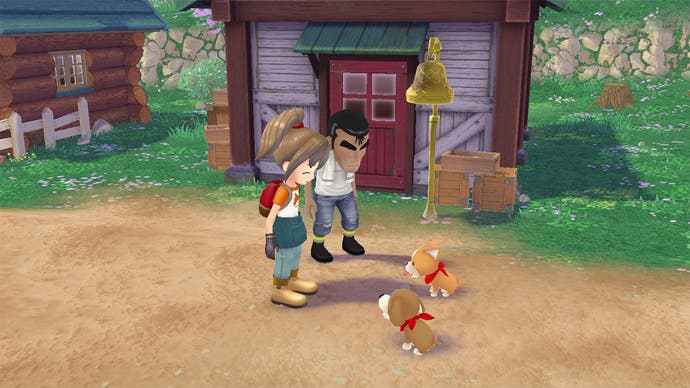
It’s always a joy to experience a remake which offers improvements rather than being a mere rehash of the original game and Story of Seasons: A Wonderful Life, the remake of Harvest Moon: A Wonderful Life, brought me that this year. From the inclusion of LGBT+ relationships to an actual recipe list to the chicken house bell – so I don’t have to spend hours of my life taking birds in and out of that building ever again – A Wonderful Life builds upon the original mechanics to create a revitalised version of this classic farming simulator. Even the shorter main campaign length works to its advantage by putting more emphasis on every decision you make.
Best of all, Story of Seasons: A Wonderful Life preserves the atmosphere of melancholy I loved so much from the original. It lingers in how you uncover the sadness in the valley resident’s stories, be it lost love or unfulfilled ambition, and the way your own character ages; hair greying, skin wrinkling and stamina bar shrinking, subtly decreasing what you can achieve each day. The seasons wash over the valley and, with them, life passes.
Ed
Metroid Prime Remastered
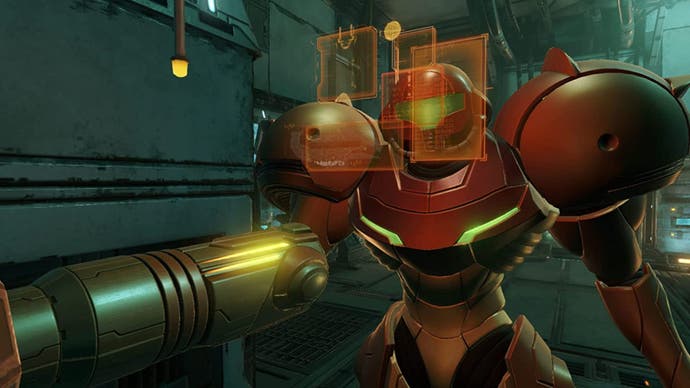
I’m not sure how much a remaster should really count in Game of the Year conversations, but playing Metroid Prime Remastered was some of the most fun I’ve had all year. I appreciate a big part of this is nostalgia; right from booting up and seeing the title screen, it took me back to being 15 and getting lost on Tallon IV all over again. Playing with dual-sticks is a revelation and with the spruced up visuals, a masterful classic became one of the best games on Switch.
Sea of Stars
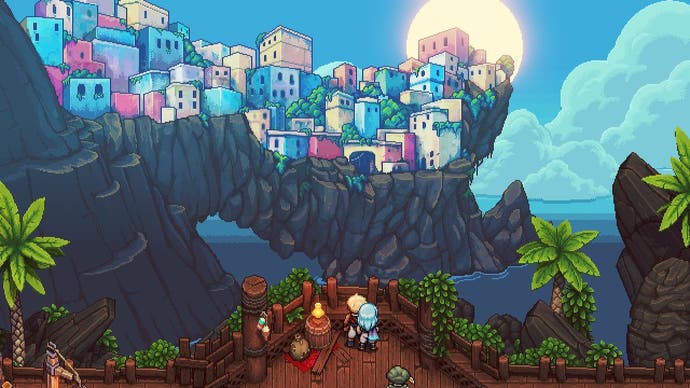
Where Metroid Prime Remastered had me feeling nostalgic, and the Super Mario RPG remake had me nostalgic for an old game I’d not even played before, Sea of Stars had me nostalgic for something brand new. It calls back to the past with its combat and presentation, but there’s always a sheen of modernity. The incandescent lighting system bathing the world in gold. The depth of its top-down world. And, perhaps best of all, the music that authentically replicates a SNES chiptune score with new richness. “Limitations breed creativity,” composer Eric Brown told me. That’s how this indie RPG calls back to the genre’s 90s heyday as a sort of greatest hits package to become one of my favourites of the year – in a vast sea of AAA stars.
Final Fantasy 16
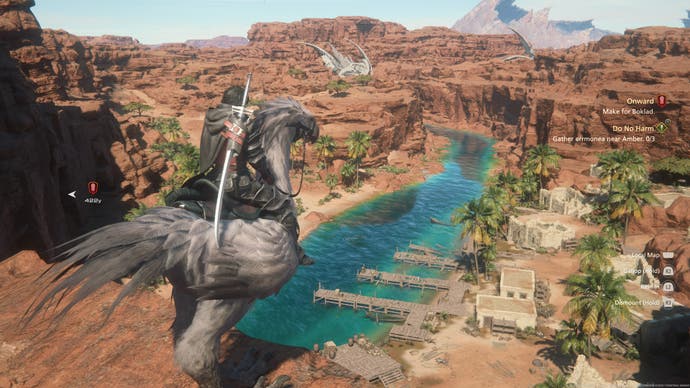
Look, I know Final Fantasy 16 has its flaws. It lacks the depth of customisation fans have come to expect from the series, its combat becomes a little repetitive, and the story loses its way. Yet I maintain its opening few hours offer some of the most intense and dramatic storytelling of the year. I fell in love with its cast of characters, thanks to emotive side quests, welcome LGBT+ representation, and mature performances from the cast. And when it all escalates through breathless cycles of shock moments and spectacular boss battles, it’s a powerfully Eikonic experience. That’s what makes this, above all, a great Final Fantasy game.
Cocoon
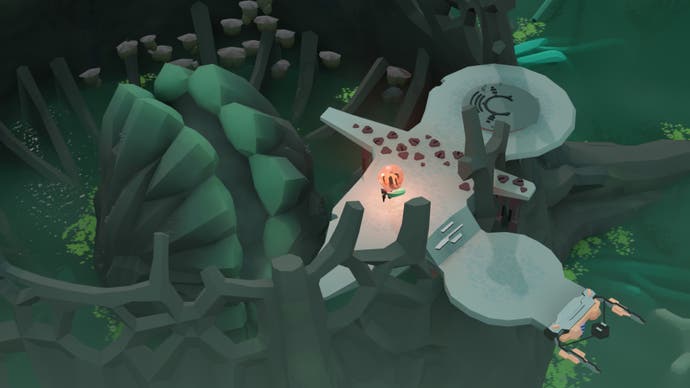
It’s a very specific skill, I think, to take something complex and explain it in simple, concise terms. That’s Cocoon in video game form. By the end, you’re jumping in and out of worlds within worlds, firing lasers through one world into another, and exploring worlds that have folded in on themselves as planetary orbs stack and stack. But at the start, it all seems so simple. You’re just a little insect in a minimalist sci-fi world with an orb on their back. Cocoon’s true achievement is its carefully curated difficulty as it slowly unfurls to make the complex seem simple – and, by extension, make you feel like a genius.
Hi-Fi Rush
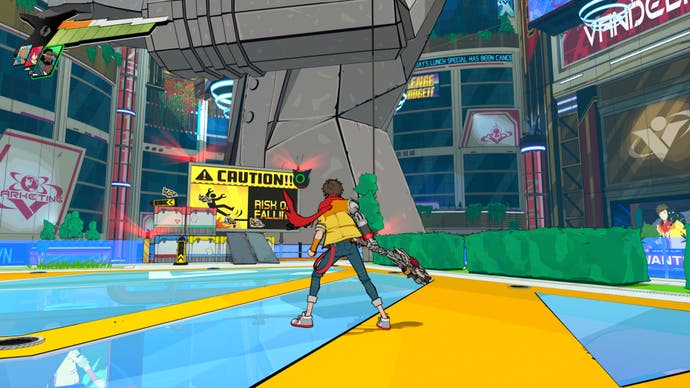
I’ve just whacked on The Joy Formidable’s song Whirring. It’s one of the licensed tracks in Hi-Fi Rush and – as I mentioned in my Hi-Fi Rush review – it’s used in a late-game climactic level that hits this huge euphoric high. Oh, the power of a good song at just the right time. I’ll admit I haven’t gone back to Hi-Fi Rush much since then, but it still left a lasting impression on me, as this riotous rush of music and colour makes the natural rhythm of fighting explicit. Combat is rewarding and novel, and made me feel like a musical superhuman, while its silly, unpretentious nature is a joy. Go on Tango, give us a sequel.
Caelyn
Remnant 2
.png?width=690&quality=75&format=jpg&auto=webp)
I can’t deal with live service games. My autistic brain is a roulette wheel of hyperfixations, so I’m either deeply engaged with something or I don’t want to do it at all. Games like Destiny 2, which I once adored, are basically unplayable. Remnant 2, which I picked up on a whim, was a breath of fresh air. Yes, the looter-shooter/Soulslike combo is catnip, but the fact that I can play intensely while my interest holds, drop when it doesn’t and – here’s the kicker – pick up again when I feel like it without having missed anything, is absolutely priceless.
The Legend of Zelda: Tears of the Kingdom
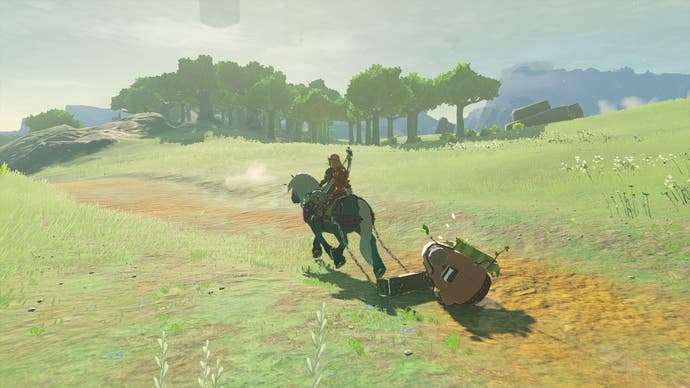
Tears of the Kingdom is a game that I haven’t really thought about since I played it. It has not inspired me to pitch think-pieces at every editor in my address book. And yes, there are lots of things that are the same as Breath of the Wild. But I recall the feelings of joy and delight playing the game evoked, and at 40 years old, sheer unadulterated glee is not a thing I experience very often, so I treasure it. TotK is a construction toy in video game form, one that is endlessly permissive and allows the player to stubbornly iterate their ridiculous solutions to problems until they actually work – a process that I repeated with a massive grin on my face the whole time. Wrapped in that gorgeous, compellingly explorable world, it was an absolute treat.
Moonring
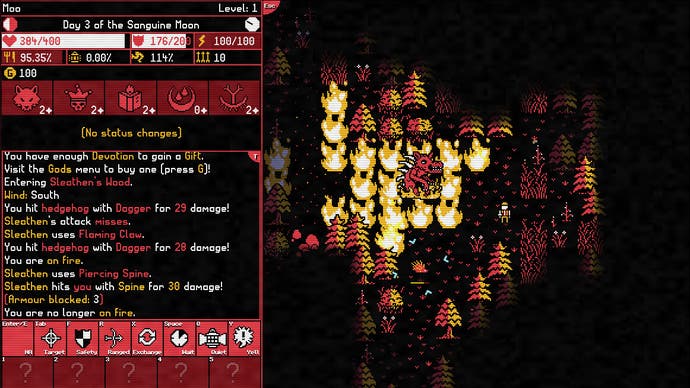
The sole indie in my top five (I managed to miss most of the big indie darlings this year), Moonring came out of nowhere and instantly got its hooks into me. I wrote the Eurogamer Moonring review so I don’t want to repeat myself, but the only thing I really want to add is that I believe the bugs which prevented me from giving that precious fifth star in the review have now been squashed, so you have no reason not to rush out and grab it from Steam immediately. It’s free!
Baldur’s Gate 3
.png?width=690&quality=75&format=jpg&auto=webp)
I have Big Feelings about BG3, since I had my initial playthrough tarnished by hitting so many game and story-breaking bugs in Act 3 that I just gave up. Since then, I’ve played it a whole lot and watched my partner, who has three full playthroughs under their belt now, play even more. BG3 is special because it absolutely nails the experience of playing a TTRPG. Everyone being horny and full of trauma isn’t realistic, but it is like a good RPG session. The difference is not having to keep to a regular schedule with four-to-six other adults, and that CRPG D&D combat isn’t complete shite.
Cyberpunk 2077: Phantom Liberty
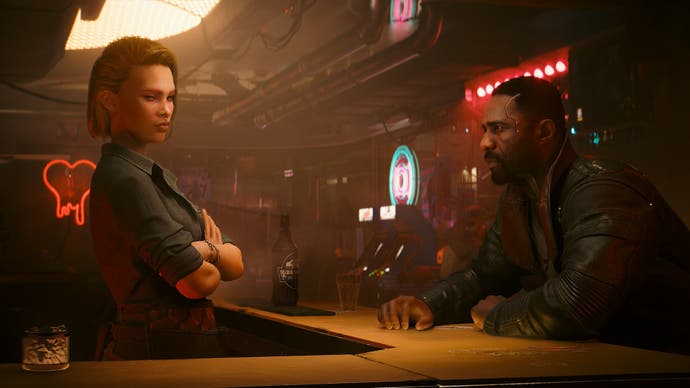
I was already a CP2077 enjoyer, then the 2.0 update came along and blew me away. It fixed every issue I had with the game and resulted in some of my favourite first-person combat ever. The power curve, going from having to carefully sneak around and choose your battles, to being able to Naruto-run across a brightly lit room while invisible or take out a whole group of gangoons before the first has hit the floor, is just exquisite.
The Phantom Liberty expansion, which I was previously feeling quite ambivalent towards, coming as it did in the middle of a packed wave of big releases, turned out to be as close to perfect as an expansion can get. It adds an engrossing, self-contained tale that also meshes seamlessly with the existing storyline and adds a handful of new features that enrich the game as a whole. My favourite CRPGs are ones that allow me to live out my own versions of genres I love. The Elder Scrolls does it for fantasy adventures, Mass Effect does it for space opera and, with 2.0 and Phantom Liberty, Cyberpunk 2077 ticks the boxes for both cyberpunk and spy thrillers.
Donlan
Rytmos

Rytmos is my favourite game of 2023 because it’s everything that I feel games should be. It’s ingenious and beautiful, of course – I particularly love the bold flat colours and the chunky playing areas that give this puzzle game a real tactility. But there’s so much more than that.
Rytmos is generous and expansive and outward looking. It’s a music game that wants you to finish its puzzles and then be sufficiently engaged to dig into the real stuff you’ve been playing with – Ethiopian Jazz or Hawaiian guitar music or early German synth stuff. It’s one of those games that is curious about the world and wants you to be curious too.
I have an old friend called Ray that I visit every now and then. He’s about 80 and he’s spoken in the past about his love of jazz and his memories of when he was young and Brighton was filled with underground jazz clubs, where the greats of the scene used to play, but always under assumed names. After playing Rytmos, I got Ray a CD filled with the Ethiopian jazz I’d been listening to all week. Next time I saw him, he had the disc on repeat all afternoon. Thanks, Rytmos!
Cocoon
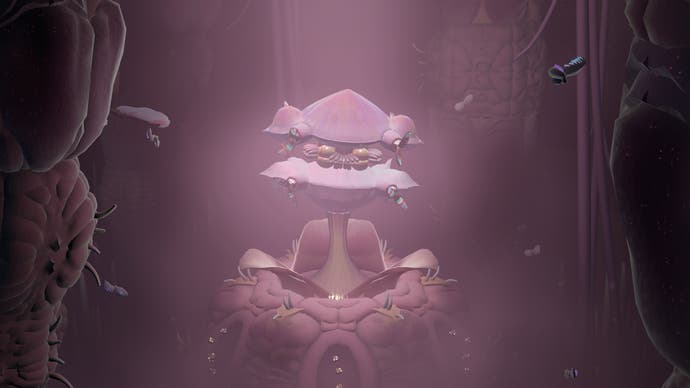
If I had to sum Cocoon up quickly, I’d say that, more than anything, it’s a very kind game. You can’t really die here, for starters; even bosses just chuck you out of the arena when you fail and ask you to try again. Its world can be creepy and sometimes disgusting, but it won’t hurt you, and it’s just as often gloriously pretty. But more than all that Cocoon is kind because it’s a complex puzzle game filled with brilliant challenges, but it’s thoughtful enough to ensure that it guides you, quietly, through the most difficult of them, so that you get to feel brilliant too.
Mediterranean Inferno
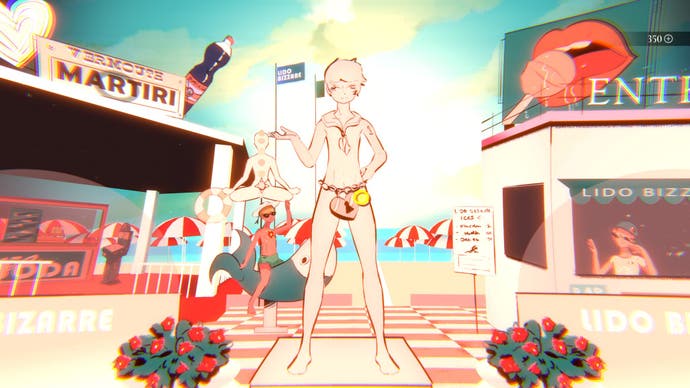
I’m going to keep this brief, because this is one of those games you could talk about forever. I had to play this game after reading Matt Wales’ wonderful review. To me, on top of all its other treasures, it’s just brilliant so see games reacting to the world around us.
There’s such a lot going on in this fiercely, unflinchingly human game, but not least there’s an attempt to explore the after-effects of the COVID pandemic and its attendant lockdown. It can do all this not just because it’s a smallish project and can be released in a timely fashion, but because it’s entirely concerned with people and relationships and emotions and those hidden, internal parts of a person’s consciousness. Lots of great games this year – none were quite like this one.
Birth
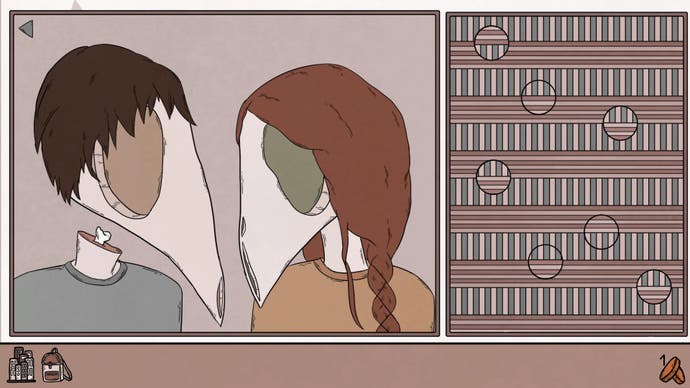
Birth is a game about loneliness which manages to reach through the screen and give its players a sense of the sad magic that it explores so thoroughly. It’s a puzzle game, and also a chill fantasy about building a companion from scraps, and it plays out in feathers and buttons and pebbles across a neighbourhood delivered in faded colours.
I played Birth as I play most things – moving between a chaotic office and my own house filled with people and pets and all that jazz that I am lucky to have around me. But for the time that I played I was transported somewhere strange and vital, and left to explore my own solitude.
Akka Arrh

I don’t think I’ll ever be able to decide whether I prefer Akka Arrh to Space Giraffe, but it doesn’t really matter. What matters is that we get both of them – which is a lot of Llamasoft genius to enjoy in one life time, frankly.
Akka Arrh is based on an old Atari prototype, but to put it like that is to underplay what Jeff Minter has done here. He’s found the chaotic soul in an old design and jolted it to life. He’s brought a kind of magical order by connecting the various elements of the thing, and in doing so, he’s created even more beautiful chaos. Akka Arrh, then is choreographer, and precisely made, but it still feels wild and exploratory. And it feels like I will never stop learning its nuances. Thanks Jeff!
Tom Senior
Pikmin 4
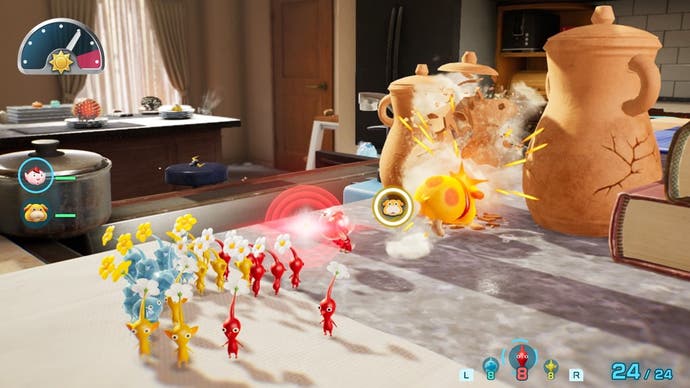
Pikmin brings to life the fairytale idea that amid the grass and rocks at the end of your garden, tiny aliens are leading hordes of adorable little carrot beings on a miniature adventure. You play as one of these aliens, using your whistle to corral colourful multitudes of Pikmin, throwing them at threats and instructing them to grab discarded human treasures. A tennis ball (labelled Sphere of Fuzzy Feelings in the game’s wonderful codex) is so huge it takes dozens of Pikmin to lift. You might need to build bridges and knock down walls to form a path back to base. It’s all worth it to see the treasure slurped up by your spacecraft.
You may play as an extraterrestrial explorer, but Pikmin is a game of small human pleasures. There’s the simple joy of gathering items, building a collection – both of loot and Pikmin themselves. Then there’s the fun of planning around the real time day night cycle. And let’s not forget the joy of making friends with a giant puppy, which you can ride around on with all of your Pikmin of course. Pikmin 4 is a consistently rewarding and gentle experience, and probably the most relaxing game of the year.
Street Fighter 6
.png?width=690&quality=75&format=jpg&auto=webp)
All bright colours and bulging muscles, Street Fighter 6 is a surprisingly weird step for the venerable series. The (very long) single player campaign lets you make your own fighter and charge around a couple of cities populated by gangs with cardboard boxes over their heads. Characters from the main roster linger around like celebrities – Chun Li teaches students in Chinatown while Ken broods in a construction site. You can even give them gifts to level up your friendship. I thought I’d hate it, but I honestly kinda love it.
It would all be too odd without Street Fighter’s irresistible combat holding everything up. In single player you can bolt different special moves onto your character to create a broken collage of clashing combat styles, but arcade mode the main cast and their meticulously honed move sets truly shine. I’ll always enjoy playing as Ken, but I want to master Jamie’s drunken master style and Kimberly’s ninja flips. Online matchmaking is fast and delivers good matchups too. It’s all too easy to lose an hour trying a new fighter and learning to avoid Zangief’s devastating power bombs. After all these years and dozens of competitors, Street Fighter is still the best.
The Legend of Zelda: Tears of the Kingdom
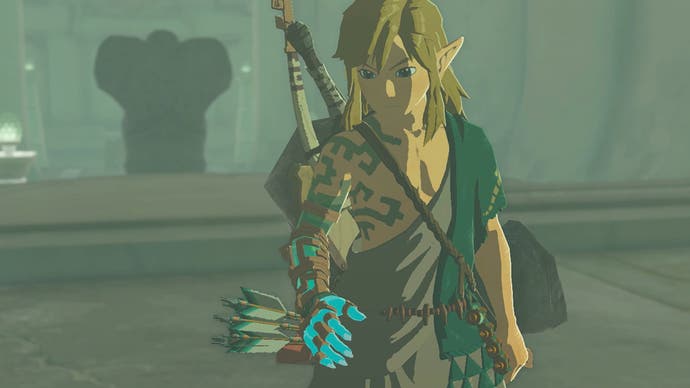
I never thought I’d be building battle robots and flying machines in a Zelda game, but here we are in 2023, blowing up enemy machines and crashing headfirst into mountains. Tears of the Kingdom takes the strong sandbox fundamentals of Breath of the Wild (along with its map) and adds more ways to mess with it. The map has been reinvented enough to keep me wanting to see how the next area has changed. The pleasure of raw exploration in harsh climates has been replaced with the subtler satisfaction of rediscovering old haunts and meeting up with old friends.
Not that there’s nothing new to discover. The sky islands hide new secrets at terrifying heights, and the depths turn light into a precious resource as you ride clunking, cobbled-together vehicles across poisoned terrain. In many ways it’s more of the same Breath of the Wild magic, but it’s still magic.
Marvel’s Spider-Man 2
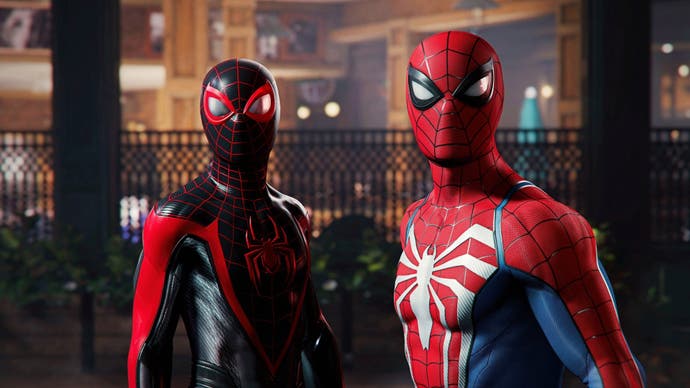
Is there a more fun way to traverse a game world than web slinging in Insomniac’s Spider-Man games? I can’t think of one, and after putting dozens of hours into the entire series, I still love it. My stomach still drops a little when I plunge off a building head first and swing at the last moment, feet skimming the New York traffic. The webs transfer that downward momentum into forward force, and I pass by my next objective entirely because I’m too busy performing flips and boosting off lamp posts.
It’s a great piece of Spider-Man fan service too. Peter Parker and Miles Morales take turns beating up Marvel canon villains while going through hell in the process. In true Spider-Man style, the heroes are wrestling with a few personal demons as they try their best to support the community and in their own way, as best they can, make the world a better place. Sounds cheesy, doesn’t it? That’s how Spider-Man should be – fast, funny, and deeply earnest.
Armored Core 6: Fires of Rubicon
.jpg?width=690&quality=75&format=jpg&auto=webp)
I didn’t realise how much I’d like to swap my legs for a set of massive tank tracks until I played Armored Core 6. On a cold, sad planet you jet around brutalist arenas, spraying rockets and plasma blasts at equally agile enemy mechs. The combat is thrilling, and I even found myself buying into the sparsely told story of warring merc groups. More than anything I love the toy shop fun of unlocking new parts to bolt onto my mech.
There are careful weight and power supply limitations to work around. Adding massive tank tracks lets me equip a rocket launcher to each arm, along with massive shoulder pads that protect my enormous torso. The resulting mess of a machine looks hilarious and is absolutely useless in combat. Still, I love that the game is happy to let me try to beat missions with this trundling, farcical metal man. It helps that the boss fights are so tense, and occasionally you get to fly into a giant skyscraper-sized machine to perform a Death Star style takedown. If you don’t mind the sparse storytelling, this should be your next action game.

